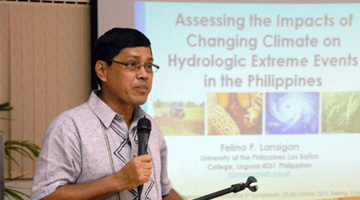 “Climate change is a reality”, Dr. Felino P. Lansigan emphasized during a recently held seminar sponsored by the Philippine Council for Agriculture, Aquatic and Natural Resources Research and Development.
“Climate change is a reality”, Dr. Felino P. Lansigan emphasized during a recently held seminar sponsored by the Philippine Council for Agriculture, Aquatic and Natural Resources Research and Development.
Dr. Lansigan is a professor on environmental statistics at the University of the Philippines Los Baños (UPLB). He is also an affiliate professor of land and water resources at the UPLB College of Engineering and Agro-Industrial Technology and of environmental science at the UPLB School of Environmental Science and Management.
At the seminar, Lansigan highlighted the effects of climate change and climate variability in the country. These effects include vulnerability of hydrological cycle to climate change, losses in agriculture, and droughts and floods affecting crops and livestock.
According to him, there is a need for efficient and effective adaptation strategies and measures to minimize the adverse effects and impacts of climate change.
Lansigan suggested improving seasonal climate forecasting using advanced technologies such as remote sensing, satellite technology, early warning system, and hydromet data collection.
Moreover, crop forecasting should be improved coupled with the implementation of a sound adaptation strategy to climate variability. Improvements can include updated engineering design standards, water management, and anadaptive crop calendar.
Dr. Lansigan stressed that these adaptation strategies and measures should be knowledge-based, making use of advances and developments in science and technology.
He added that local government units should have enough capacity in climate resilience and climate change adaptation, specifically in their development planning and operations.
Lansigan also strongly encouraged the conduct of research and development (R&D) on these climate change risks and adaptation strategies, and upscaling these strategies to local stakeholders.
“Climate change adaptation is not a cost, but an investment”, he concluded. “It avoids the need for reconstruction whenever calamity occurs.”
